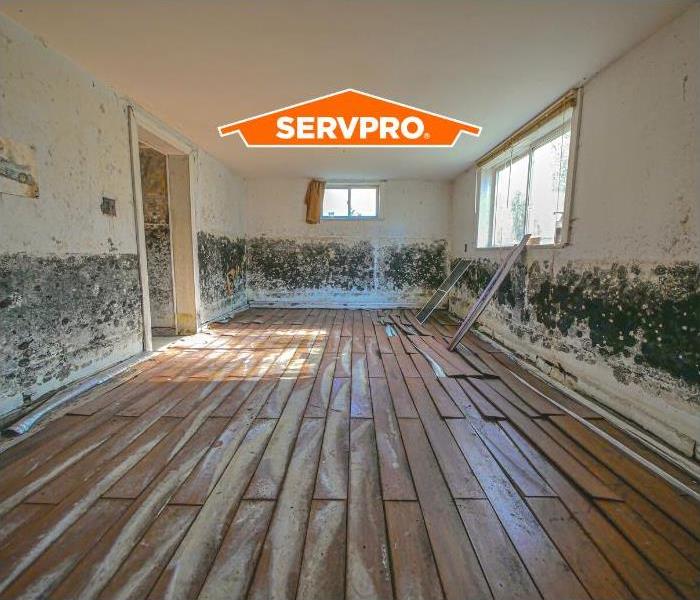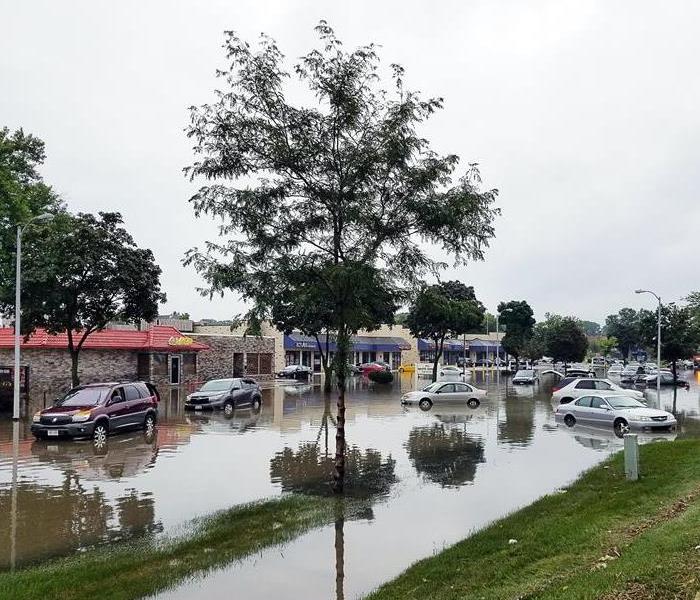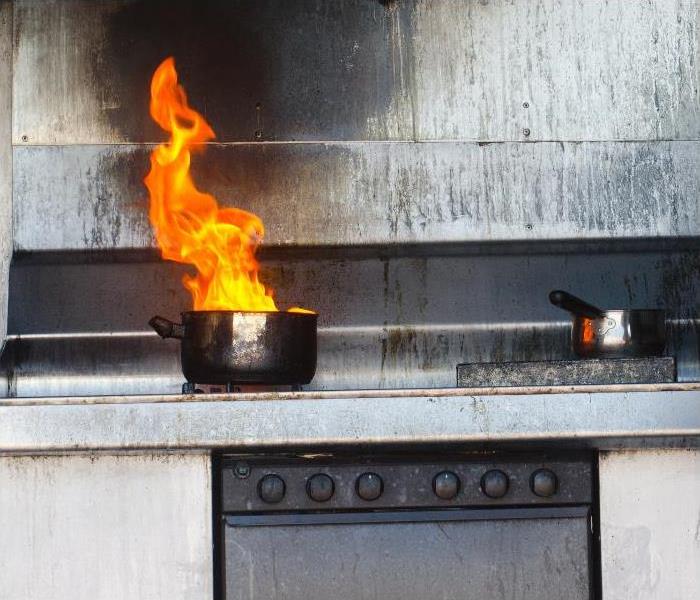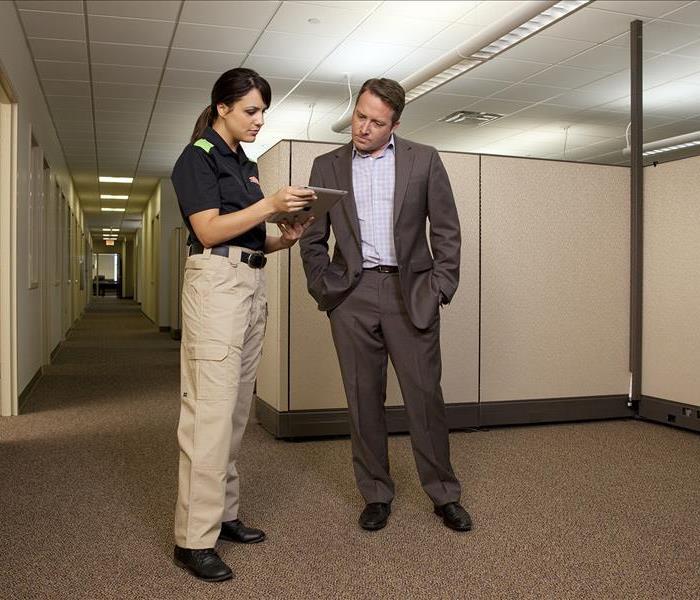Recent Posts
Colorado Residental Water Restoration
11/2/2023 (Permalink)
Whether it’s from a pipe, a leaky roof or a flood, water in home environments can be difficult to deal with. Not only can the structure of your house be affected, but your belongings may be as well. If you don’t handle these items properly, you could make matters worse.
If you have water damage in your Colorado , home, using the following steps may help save your property.
Clean and Sanitize
If the water has come from a broken pipe, then you may not be too concerned about sanitizing your items, since this water will generally be clean. However, in cases of floods or storms, this is a very important step. Black water from a flood carries many contaminants with it, including harmful bacteria and sewage waste. Because coming into contact with this water can be hazardous, it is a good idea to hire a professional service to remove it from your home.
Wash Clothing and Soft Objects
For smaller items such as clothing or stuffed toys, a run through the washing machine and dryer may return them to their previous condition. Do not allow them to sit or you risk a fungal growth, as porous objects easily hold mold spores and moisture. If you have products that cannot be put in the wash, dry cleaning is an option as well. This process uses a chemical solvent to clean materials.
Allow Wet Items to Dry
Once your items are cleaned, they should be allowed to dry thoroughly. If all of the water in your home has not yet been removed, you should consider relocating your belongings. If your home has multiple levels, you may want to move wet items to a higher floor. For those where sun damage is not a concern, bringing them outside may help them to dry more quickly.
No matter where the water in your home has come from, you should act quickly to prevent long-term damage to both the building and your belongings.
Call SERVPRO® of Denver West if you have water damage 303-576-6868. They will send a trained, certified technician to your home or business.
Fire Escape Plan for High-rise Living?
11/1/2023 (Permalink)
SERVPRO® of Denver West has been responding to fire damage emergencies for years in Colorado, and we know that having an emergency escape plan in the event of a fire emergency can save your life and the lives of your loved ones. Here are some tips for escaping a fire from the National Fire Protection (NFPA):
- GO to your outside meeting place and stay there. Call the fire department. If someone is trapped in the building, notify the fire department.
- If you can’t get out of your apartment because of fire, smoke or a disability, STUFF wet towels or sheets around the door and vents to keep smoke out.
- CALL the fire department and tell them where you are.
- OPEN a window slightly and wave a bright cloth to signal your location. Be prepared to close the window if it makes the smoke condition worse.
- Fire department evacuation of a high-rise building can take a long time.
- Communicate with the fire department to monitor evacuation status.
Call Us Today!
If your high-rise apartment or commercial business experiences a fire damage,
SERVPRO® of Denver West is Here to Help. ® Our technicians are on call 24/7 and have the advanced training and equipment to mitigate any fire damage. Call us today at 303-576-6868. We’ll restore your fire damage in Denver, “Like it never even happened.”
Water Intrusion Damage in Denver?
5/12/2023 (Permalink)
Water intrusion prevention tips.
Water intrusion is the unwanted movement of water and water vapor into a structure. SERVPRO® of Denver West witnesses firsthand the damage that water can do to a home or commercial business in Englewood and we have a team of water restoration technicians on call 24 hours a day to mitigate water damage jobs of all kinds and sizes.
Water damage is one of the most expensive types of damage a structure can experience, but there are many things that can be done to prevent this from occurring. Here are some tips for preventing water intrusion from the University of San Diego:
- Ensure windows of buildings can close and seal to prevent rainwater intrusion or the potential for condensation from outdoor humidity levels.
- Identify and quickly fix roof leaks, window leaks, or door leaks.
- Reseal roofs, flashing and ensure proper distance of fascia to reduce water penetration to the building façade.
- Keep rain gutters and floor drains clear of debris to prevent water backup and flooding.
- Immediately fix leaky plumbing fixtures and clogged toilets or drains.
Call Us!
When you need someone to mitigate water damage, SERVPRO® of Denver West is Here to Help.® Call us today at 303-576-6868. We’ll restore your property damage in Englewood, “Like it never even happened.”
SERVPRO of Denver West is Independently Owned and Operated.
How to Prevent or Handle Frozen Water Pipes
2/13/2023 (Permalink)
Winter might be harsh outdoors, but when frozen water pipes burst, the real emergency conditions are, ever so suddenly, indoors. Whether you’re thinking ahead to protect yourself from this bad scenario—or you’re thinking on your toes in an actual pipe-burst situation—you can use the following helpful tips to ensure that you act smart.
Prevention Tips:
- Insulate your water pipes.
Contrary to popular belief, it’s not expanding ice from within a pipe that makes it burst; it’s the remaining liquid water finding nowhere else to go but out. Wherever your pipes are warm to the touch, insulation is likely needed. Insulating your pipes not only serves as a preventative measure for pipe bursts but also reduces the cost you pay for hot water. Ask a local hardware store for pipe insulation that you can install quickly and painlessly.
- Seal those seams.
To keep cold wind away from your pipes, seal cracks and holes in your walls with caulking. Simply walk along the walls of your house and feel for drafts. And for fainter drafts, light an incense stick. When the smoke is offset, there’s a draft.
- Some doors are best left open.
Did you know? Kitchen and bathroom cabinets can keep warm inside air from reaching pipes under sinks or in adjacent outside walls. It’s a good idea to keep cabinet doors open during cold spells to let warm air circulate around the pipes to prevent freezing.
- Don’t hesitate to use your taps.
As long as water is running and pressure doesn’t build up, there’s a far lower risk of freeze and pipes bursting. Also, it’s okay to let faucets lightly drip where you believe there could be risk of cold pipes. The slight relief in pressure prevents potential buildup within your pipes.
- Leaving for a trip? Don’t over-lower the heat.
While understandably it saves money to lower your thermostat when you’re away from home, it’s important to not be overzealous and allow your home to cool excessively in your absence. A home kept reasonably warm will ensure pipes share the same cozy condition.
If your property experiences a water loss call the professionals at SERVPRO® of Denver West, our dedicated team will make it like it never even happened.
Why Are Your Pipes Freezing?
12/9/2022 (Permalink)
Temperatures outside must drop to 20 degrees or lower in order for a pipe to freeze. Newly built homes in northern climates tend to be well insulated with water pipes located on the inner parts of the house for extra protection. Homes built in southern climates can face problematic hard freezes due to homes not being built to accommodate cold temperatures.
Which Pipes Are Vulnerable to Freezing?
- Pipes located on the outer walls of the home
- Pipes located in unheated garages, attics, crawl spaces, and basements
- Copper pipes
- Galvanized pipes
- Uninsulated pipes
So What if Your Pipes Freeze?
When temperatures drop, water freezes and expands causing pipes to burst.
A burst pipe can result in a water leak. Ruptured pipes and water damage can cost thousands of dollars to repair. The amount of damage depends on where the burst occurs, how long it takes to catch the problem, and how much water is leaking from the pipe.
Prevent Your Pipes From Freezing.
- Install Insulation
- Insulate pipes on the outside of your home
- When temperatures drop, open your faucets to a slow dribble
- Open cabinets for warm air to circulate through your home
- Keep the thermostat set to the same temperature during the night and day
- If you leave your home for extended periods of time leave your heat on at 55 degrees
What Do You Do if Your Pipes Freeze?
- Turn off the main water valve
- Call a professional plumber
- Call an IICRC-certified restoration & mitigation company
SERVPRO of Denver West’s Water Restoration Process
The restoration process begins when you call us. Our representative will guide you through the crisis and may ask several questions to help us better understand the equipment and resources.
We determine the scope of your water damage at this stage. We inspect and test to determine the extent of damage and how far the moisture has traveled to ensure proper and complete restoration.
The water removal process begins almost immediately and removes the majority of the water. We use powerful pumps and vacuum units to quickly remove hundreds or thousands of gallons from your property, which helps prevent secondary water damage and mold growth.
We use specialized equipment to remove the remaining water that is harder to access. Our professionals will use room measurements, temperature, and relative humidity to determine the optimal number of air movers and dehumidifiers needed to dry your home or business.
We clean all of the restorable items and structures damaged by the water. We are adept at cleaning contents using a number of techniques. Our professionals are trained to provide sanitizing treatments and remove odors and deodorize your property.
Restoration is the process of restoring your home or business to its pre-water damage condition. Restoration may involve minor repairs, such as replacing drywall and installing new carpet or may entail major repairs, such as the reconstruction of various areas or rooms in a home or business.
Call us at 303-576-6868 if you have any questions or concerns.
Should Mold Testing or Sampling Be Performed To Your Property?
10/18/2022 (Permalink)
Mold Testing or Sampling
Is sampling for mold needed? In most cases, if visible mold growth is present, sampling is unnecessary. Since no EPA or other federal limits have been set for mold or mold spores, sampling cannot be used to check a building's compliance with federal mold standards. Surface sampling may be useful to determine if an area has been adequately cleaned or remediated. Sampling for mold should be conducted by professionals who have specific experience in designing mold sampling protocols, sampling methods and interpreting results. Sample analysis should follow analytical methods recommended by the American Industrial Hygiene Association (AIHA), the American Conference of Governmental Industrial Hygienists (ACGIH), or other professional organizations.
Are there federal regulations or standards regarding mold testing?
Standards or Threshold Limit Values (TLVs) for airborne concentrations of mold, or mold spores, have not been set. Currently, there are no EPA regulations or standards for airborne mold contaminants.
Understanding Mold
When water intrudes into your property, mold growth can start in as little as 48 hours. Consider the following mold facts:
- Mold is present almost everywhere, indoors and outdoors.
- Mold spores are microscopic, float along in the air, and may enter your home through windows, doors, or AC/heating systems or even hitch a ride indoors on your clothing or a pet.
- Mold spores thrive on moisture. Mold spores can quickly grow into colonies when exposed to water. These colonies may produce allergens and irritants.
- Before mold remediation can begin, any sources of water or moisture must be addressed. Otherwise, the mold may return.
- Mold often produces a strong, musty odor, and that odor can lead you to possible mold problem areas.
- Even higher-than-normal indoor humidity can support mold growth. Keep indoor humidity below 45 percent.
The Mold Remediation Process
Every mold damage scenario is different and requires a unique solution, but the general mold remediation process stays the same. Learn more about our mold remediation process.
- Emergency Contact - (303) 576-6868
- Inspection and Mold Damage Assessment
- Mold Containment
- Air Filtration
- Removing Mold and Mold-Infested Materials
- Cleaning Contents and Belongings
What To Do When Disaster Strikes?
9/27/2022 (Permalink)
It happens when you least expect it. You take the steps to the basement, and when your foot hits the floor, you step onto wet carpet. You have no idea where the water is coming from, or how long it’s been there.
After the initial shock and confusion, you may find yourself asking, “What do I do now?”. The following steps can help you navigate the process of managing a water loss in a quick, effective manner, reducing the amount of damage to your home, and keeping the overall cost to you as low as possible.
Stopping The Source
Stopping the flow of water is the first step to getting on the right track. Shutting off the water to the appliance or area that is leaking is important to be able to fix the leak. If you are able, shut the water off to this area, or to the whole house if you are unsure of where the water is coming from.
Once the leak is identified, or even if you are unsure of the cause, calling a Licensed Plumber to identify and fix the problem is highly advisable. This ensures that the leak is fixed correctly, and/or that the appliance in question is properly repaired or replaced.
Keeping Damages to a Minimum
Once any amount of water has leaked into your home, there will be damage. However, you can keep this damage to a minimum by calling SERVPRO® of Denver West as soon as possible at 303-576-6868. The sooner we arrive, the sooner we can begin to clean up and minimize the damage, potentially saving you thousands of dollars in home repairs.
Also, the less time the water spends saturating the materials in your home, the lower the likelihood that your home will develop mold and microbial growth.
Sewage
Water leaking into your home is never desirable. Sewage leaking into your home can be considered a nightmare, especially when it affects a large area or multiple levels in your house. Exposed sewage can create a risk of mold and microbial growth, as well as illness for those in the home. Prompt clean-up and neutralization of contaminants are the first priority.
When sewage backs up through drains or toilets, the first thing to do is call a Licensed Plumber, or your city Water and Sewer Provider. Finding the source, and ensuring that there is not another sewage loss in your home is key to preventing multiple mitigations from being needed, and ultimately keeps the cost to you to a minimum.
Mitigation
Once SERVPRO® of Denver West is on-site, an initial assessment will be made of the damages and projected time needed to dry the structure. Also, an assessment will be made of the materials affected, and it will be determined if those materials can be dried, or will need to be removed.
If your contents, such as furniture, boxes, clothing, and decorative items cannot remain in place while drying, SERVPRO® of Denver West provides moving and pack-out services for on-site or off-site storage while mitigation is taking place.
The average mitigation takes about 3 days but could take less or more time depending on the level of saturation and the scale of the loss.
SERVPRO® of Denver West Technicians and Crew Chiefs use a variety of equipment and tools to ensure proper drying, including but not limited to dehumidifiers, air mover fans, and non-invasive moisture monitors.
After Mitigation
Once ensuring that your home has met industry drying standards, SERVPRO® of Denver West Crew Chiefs and Technicians will remove all equipment and remove any items brought into your home. If materials have been removed, SERVPRO® of Denver West offers construction and building repairs, allowing a quicker turnaround time for your building's restoration.
These steps can help guide you through the stressful time of water loss in your home.
Feel free to call SERVPRO® of Denver West at any time with questions about mitigation, water damage, or clean-up services at303-576-6868.
Water damage is never pleasant, but with SERVPRO® of Denver West, you can assure a professional and quality cleanup.
How To Prepare For a Natural Disaster?
9/20/2022 (Permalink)
Preparation and readiness before a natural disaster strikes can make all the difference in losing valuable possessions, and salvaging your property.
Natural fires can spark at any time. Storm waters can rage and spread quickly. Always have a flashlight, fire extinguisher, and disaster plan in place for your family and business.
These things will allow you to respond quickly and safely if an event was to occur.
SERVPRO® of Denver West provides free Emergency Response Plans (ERP) for businesses to help identify risk factors, key points in the building, and personnel notifications among many other things. Preparing in advance is Storm Readiness. Call our Development Team at 303-576-6868 for your Business Emergency Ready Plan. An account representative can implement an Emergency Ready Profile for your business at no cost.
Do you know what the number one cause of house fires is?
9/13/2022 (Permalink)
If you guessed cooking incidents then you'd be correct. These incidents are usually brought on by leaving a pot or pan unattended while you run and do something for "just a minute." According to the NFPA, 40% of all fires, or on average 156,600 per year are started this way. There is a (57%) of a fire starting on a range compared to in the oven (16%) due to frying.
Wandering if there's anything you can do to prevent becoming one of these 156,00 house fires a year? Well keep reading, SERVPRO® of Denver West has your back.
- Make sure you are always alert and never leave your food unattended while it is cooking.
- Make sure your smoke detectors are working and you have a fire extinguisher close by.
- NEVER throw water on a grease fire, it will only spread it faster. Instead, put a lid on the pan to smother the fire.
- If the fire starts in your oven, simply turn it off and keep the oven door closed until the fire is out.
- Always keep anything burnable like clothing or towels away from fires.
If your property experiences fire, soot, or smoke damage call SERVPRO® of Denver West. We have IICRC Trained staff ready to help restore your home to preloss condition. We are Here to Help® 24/7/365, call us at 303-576-6868.
Call and Plan an ERP For Your Commercial Building
9/3/2022 (Permalink)
The Best Way to Reduce Business Interruption Following a Disaster is to Plan For it NOW. As many as 50% of businesses may never recover following a disaster, according to the latest industry research. Of the businesses that survive, the overwhelming majority of them had a preparedness plan in place. Pre-planning can serve as an insurance policy aimed at peace of mind. By developing a SERVPRO® Emergency READY Profile for your business, you minimize business interruption by having an immediate plan of action. Knowing what to do and what to expect in advance is the key to timely mitigation and can help minimize how water and fire damage can affect your business.
This is what is covered in our Emergency Ready Program (ERP)
- A no-cost assessment of your facility
- A concise Profile Document that contains only critical information needed in the event of an emergency
- A guide to help you get back into your building following a disaster
- Establishes your local SERVPRO® Franchise Professional as your disaster mitigation and restoration provider
- Identification of the line of command for authorizing work to begin
- SERVPRO® is a sponsor of the American Red Cross Ready Rating™ Program
- Provides Facility details such as shut-off valve locations, priority area, and priority contact information
Preparation is a key component for making it through any size disaster, whether it’s a small water leak, a large fire, or an area flood. The best time for planning for such events is not when the event happens, but well before it happens. No one ever plans on a disaster, but you can plan for it. Now is the time to ask yourself, “Are you ready for whatever could happen?” Call SERVPRO® of Denver West at 303-576-6868 to get your ERP started.






 24/7 Emergency Service
24/7 Emergency Service



